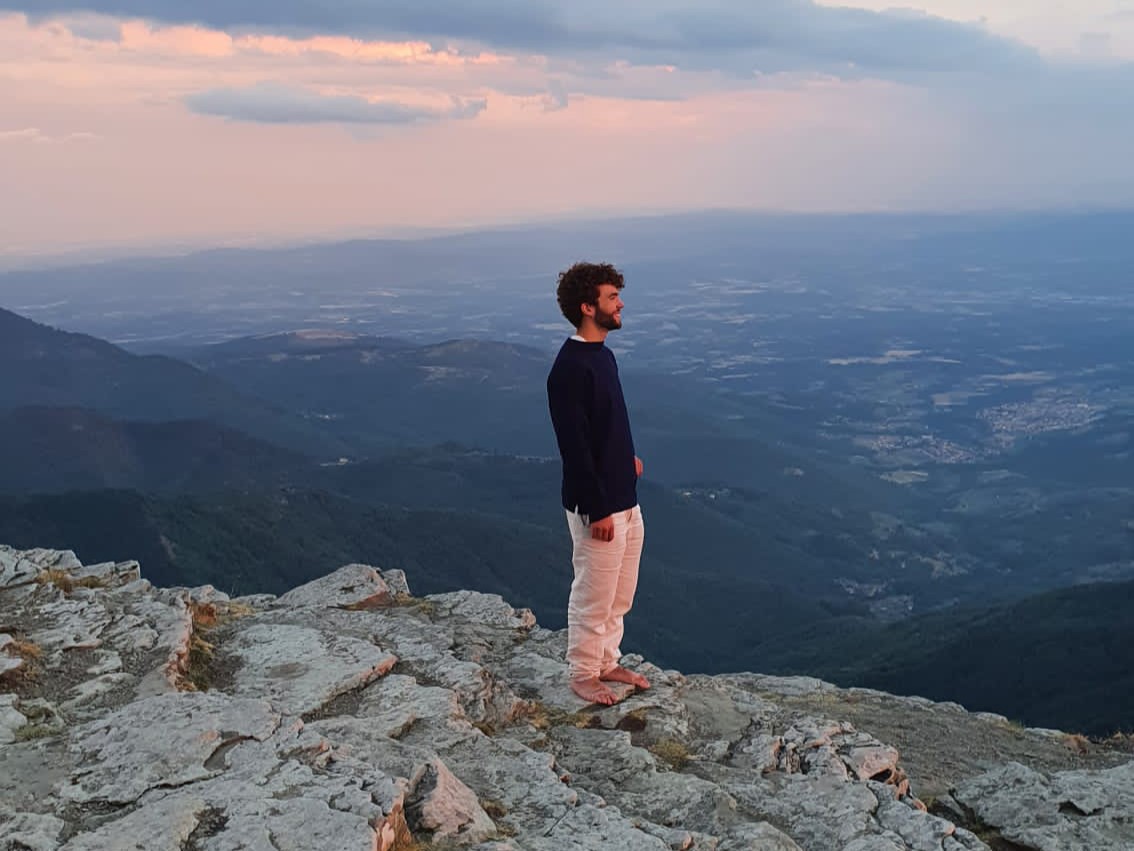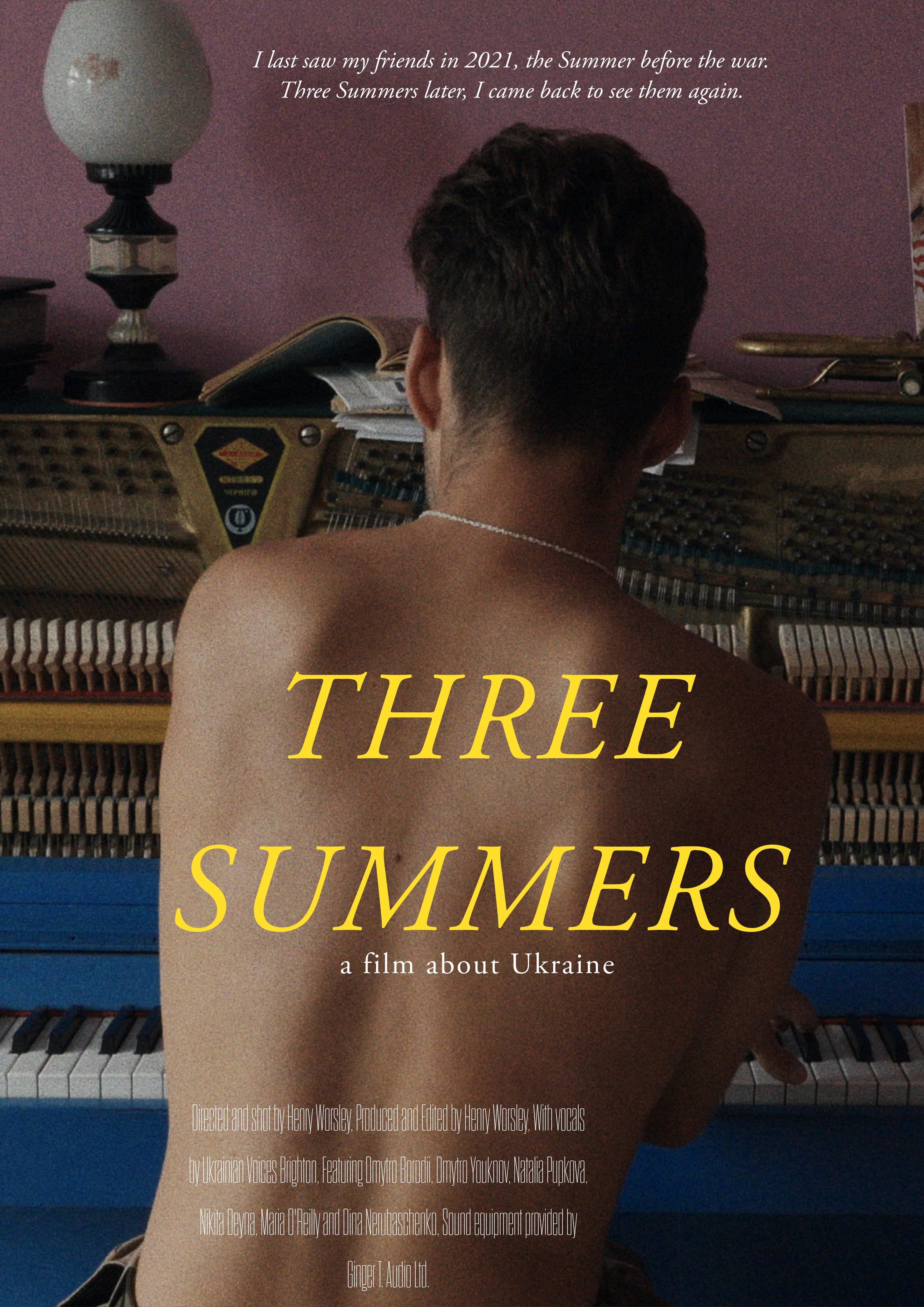More Pembroke news
A conversation with Pembroke student Henry Worsley on his film about Ukraine
NEWS |
A conversation over the phone with his Ukrainian friend Dima, describing an evening spent smoking on the beach in Odesa and watching Russian missiles in the night sky, like dystopian shooting stars, was enough to convince Pembroke student Henry Worsley (2021, History and Modern Languages) to return to Ukraine.

‘I wanted to do something to immortalise their memory,’ Henry said about his friends there, grappling with the awareness that their lives are at risk at home. That ‘something’ ended up being a full-length documentary entitled ‘Three Summers: A film about Ukraine’, capturing a beautiful summer in the lives of his friends where war lingers in the background. The film is being screened later this month here in Oxford at the Ultimate Picture Palace to raise money for the Ukrainian Society’s ambulance campaign.
Henry met Nikita, the film’s protagonist, three summers ago on CouchSurfing, a website and app where you can request to stay at someone’s place for a short time, intending to spend only one night at Nikita’s place in Odesa but prolonging his stay to two weeks. An ex-merchant sailor in the North Sea in his early 20s, Nikita is the kind of guy who, as Henry describes him, ‘lives life to the full.’
Henry expected Nikita’s experience fighting in a war to which he lost his younger brother to dampen his positive outlook on life. But when he arrived in Odesa he found (mostly) the same ‘really cool, hipstery, piano-playing guy’ he had met in Odesa three years ago. Henry describes him as an enigmatic guy who is simultaneously a war veteran and ‘the sort of guy who has a mullet and eats avocado toast.’ Nikita’s piano arrangements infuse Henry’s film with a sense of beauty that juxtaposes the heaps of grey rubble and cement inside the bombed-out building where Henry interviewed Nikita.

Nikita’s interview acts as the film’s backbone; we hear him talk about everything from his childhood to crazy war stories and his relationship with his brother. It was clear from the start, according to Henry, that Nikita wanted to make this film for his brother to whom it is dedicated. For Nikita and the people in the film, their involvement in the war has little to do with the ‘big politics of NATO.’ As Henry sees it, ‘it’s about protecting, at least for Nikita, his family and friends…it’s just about protecting your home from an invader.’
Henry has been interested in filmmaking for as long as he can remember. He recalls using his Lego as a seven-year-old to make home-made stop-motion movies. Deciding to fly to a war zone in the summer of 2023 to film a full-length documentary, it seems Henry has upped the ante. Flying to Krakow in Poland to take a night bus over the border, he took the train from Lviv to Kyiv to stay with his friend Dima. In the weeks before his trip, Henry recalls having vivid nightmares of Nikita running down one of Odesa’s long boulevards with bombs going off behind him.
Yet when Henry arrived in Ukraine, he found most of his friends to be unexpectedly nonchalant. In one of the film’s scenes, we see Dima’s younger brother chilling around the house in his pyjamas, scrolling on TikTok whilst bombs can be heard going off in the background. On the train from Kyiv to Odesa, Henry struggled to find a seat on a packed train full of Ukrainians on their way to spend their summer holidays on the beach. A girl seen dancing in the film’s trailer organises raves in Odesa, Henry tells us. That is the film’s overarching theme according to Henry – young people going about their daily lives as normal despite their home being invaded.
Henry describes one nerve-wracking moment when him and his friends were late for curfew in Odesa, the pitch-black, deserted city disconcertingly similar to how it appeared in his nightmares before flying out to Ukraine. Stopped by men with Kalashnikovs who checked their IDs, all they wanted from Henry when they saw his English passport was for him to say ‘bottle of water.’ In an Irish pub in Odesa, Henry met a man who turned out to be a Ukrainian pop-star-turned-soldier with a big scar on his face from a shelling in Karkhiv. Seeing him being stopped on the street for selfies was ‘like meeting Harry Styles and he’s just been in the trenches,’ laughs Henry. These absurdly humorous, light-hearted moments in spite of tragedy was what Henry hoped to capture. ‘When you see Nikita and his friends go clubbing or down to the beach and just chilling out, it suddenly becomes much more familiar with our own lives,’ he reflects.
As for Henry, having spent his year abroad at film school in Rome, he now hopes to apply for a film Master’s at the National Film School in Beaconsfield as a next step after Pembroke. He hopes to make his next documentary about the national sport of Kirgizstan ‘Kok boru’ or ‘horse football but with a headless goat,’ as he described it.
Don’t miss the screening of Henry’s film at the Ultimate Picture Palace in Cowley on the 25th of November at 8.30 pm. Find out more here and watch the film's trailer here.
We wish Henry all the best with his future filmmaking and thank him for the time he spent talking to us about his film.

